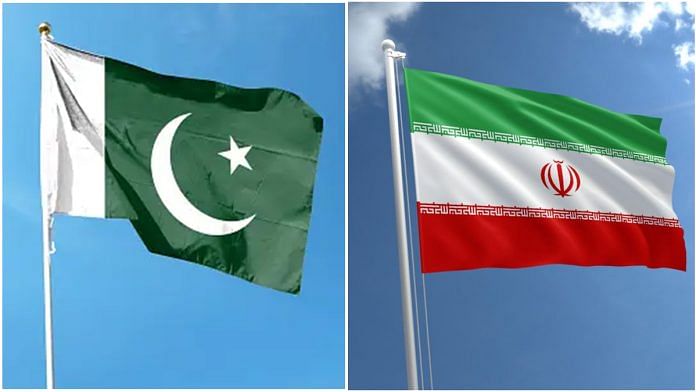New Delhi: Tensions between Tehran and Islamabad escalated Thursday, as the Pakistani Air Force carried out retaliatory strikes against suspected militant targets within Iranian territory. This came after Iran’s Revolutionary Guards Tuesday launched airstrikes in Pakistan’s Balochistan province Tuesday, allegedly targeting bases of the Sunni militant group Jaish-al Adl.
Iran’s action, also prompted Islamabad to recall its ambassador to Iran and suspend all high-level visits to the country. The Iranian ambassador to Pakistan, who is reportedly not in the country, has also been asked not to return by Islamabad.
While the two countries have traditionally shared good ties, the issue of militancy and Pakistan’s growing proximity to Saudi Arabia, which Iran views as a rival, has caused tensions between Islamabad and Tehran in recent decades.
Iran’s strikes in Balochistan came hours after Pakistani caretaker Prime Minister Anwaar ul Haq Kakar met Iran Foreign Minister Hossein Amir-Abdollahian on the sidelines of the World Economic Forum in Davos.
The Iranian Ambassador to Pakistan, who is currently not in the country, has also been asked not to return by Islamabad.
Jaish al-Adl, or the “Army of Justice,” is a Sunni militant group founded in 2012 and which operates largely near the Pakistan-Iran border. The group was also reportedly involved in the alleged abduction of former Indian Navy officer Kulbhushan Jadhav from Bandar Abbas, near Chabahar port in 2016. Jadhav was allegedly traded in exchange for money.
Pakistan media has cited officials as saying that the strikes by Iran’s Revolutionary Guards damaged a mosque and killed two children in Balochistan’s Panjgur district, about 50 km inside Pakistan from the Iranian border.
Pakistan has called the attack an “unprovoked violation of its airspace”. “This violation of Pakistan’s sovereignty is completely unacceptable and can have serious consequences,” a statement from Pakistan’s Foreign Ministry said Wednesday,
Pakistan, it said, “has always said terrorism is a common threat to all countries in the region that requires coordinated action”, and added, “Such unilateral acts are not in conformity with good neighbourly relations and can seriously undermine bilateral trust and confidence”.
On his part, Iran’s foreign minister Hossein Amir-Abdollahian has reportedly said that his country was targeting bases of the “Iranian terrorist group” Jaish al-Adl.
Balochistan has reportedly been facing insurgency over the past few decades. Pakistan has been accused of exploiting the region for its resources, as well as launching a military-led brutal crackdown in the region, with citizens, including political activists, going missing. However, Islamabad blames violence in the province on India and Iran — a charge both nations have rejected.
Last month, hundreds of Baloch women marched into Islamabad to protest against the alleged enforced disappearances of men in the province. Roughly 200 women were reportedly arrested but released later.
Also Read: Iran’s dramatic airstrikes on Pakistan have brought Middle East proxy war too close to home
Militancy, Saudi Arabia — sore points in Tehran-Islamabad’s ties
Iran’s airstrikes in Pakistan came nearly a month after an attack on a police station in Iran’s Sistan and Baluchestan Province — which is close to the country’s border with Afghanistan and Pakistan — killed 11 officers. Jaish al-Adl, a militant group designated as a terrorist group by both the US and Iran, claimed responsibility for the attack, seen as one of the deadliest in the region in years.
While Iran and Pakistan have historically shared good bilateral ties, Islamabad’s proximity to Riyadh in the past few decades has been a point of contention between the two countries, given the animosity between Iran and Saudi Arabia for influence in the Middle East. Pakistan and Saudi Arabia are Sunni-majority countries, while Iran is a Shia country.
While Saudi Arabia saw itself as the leader of the Muslim world, Iran’s 1979 Islamic revolution challenged this notion. The strategic rivalry between the two countries worsened until last year, when Tehran and Riyadh reached a Chinese-mediated agreement, easing tensions between the two countries.
Meanwhile, Pakistan Chief of Army Staff General Syed Asim Munir reportedly visited Iran last year and met with Iranian top military leaders, including its army chief Major General Mohammad Bagheri.
Militancy has also reportedly been a hiccup in the relationship. For instance, in April last year, alleged militants entering Pakistan from its border with Iran killed four soldiers in Balochistan province. Iran has previously suspected the Sunni-majority Pakistan of harbouring insurgents, possibly on behalf of regional rival Saudi Arabia.
While Iran has been fighting militants across its border, a missile-and-drone attack on the country is unprecedented.
After Tuesday’s attack, China called on both sides to “exercise restraint” and “avoid actions that would lead to an escalation of tension and work together to maintain peace and stability”.
Meanwhile, Tuesday’s attack appears to be part of Iran’s targeted strikes on groups it views as hostile. Earlier this week, Iran launched strikes into northern Syria, targeting the Islamic State group and into Iraq at an alleged Israeli “spy headquarters” near the US Consulate compound in the city of Erbil.
Iraq called the attacks, which killed at least four civilians, a “blatant violation” of Iraq’s sovereignty and recalled its ambassador from Tehran Tuesday.
These strikes followed a double suicide bombing at a ceremony honoring Revolutionary Guard General Qassem Soleimani in Iran’s Kerman this month killed over 90 people. The Sunni militant group Islamic State claimed responsibility for the attack which came amid concerns about an escalation of the ongoing Israel-Hamas conflict.
(Edited by Uttara Ramaswamy)
Also Read: Iran’s terror bombings show Middle East is on edge. We don’t have infinite time for dialogue



